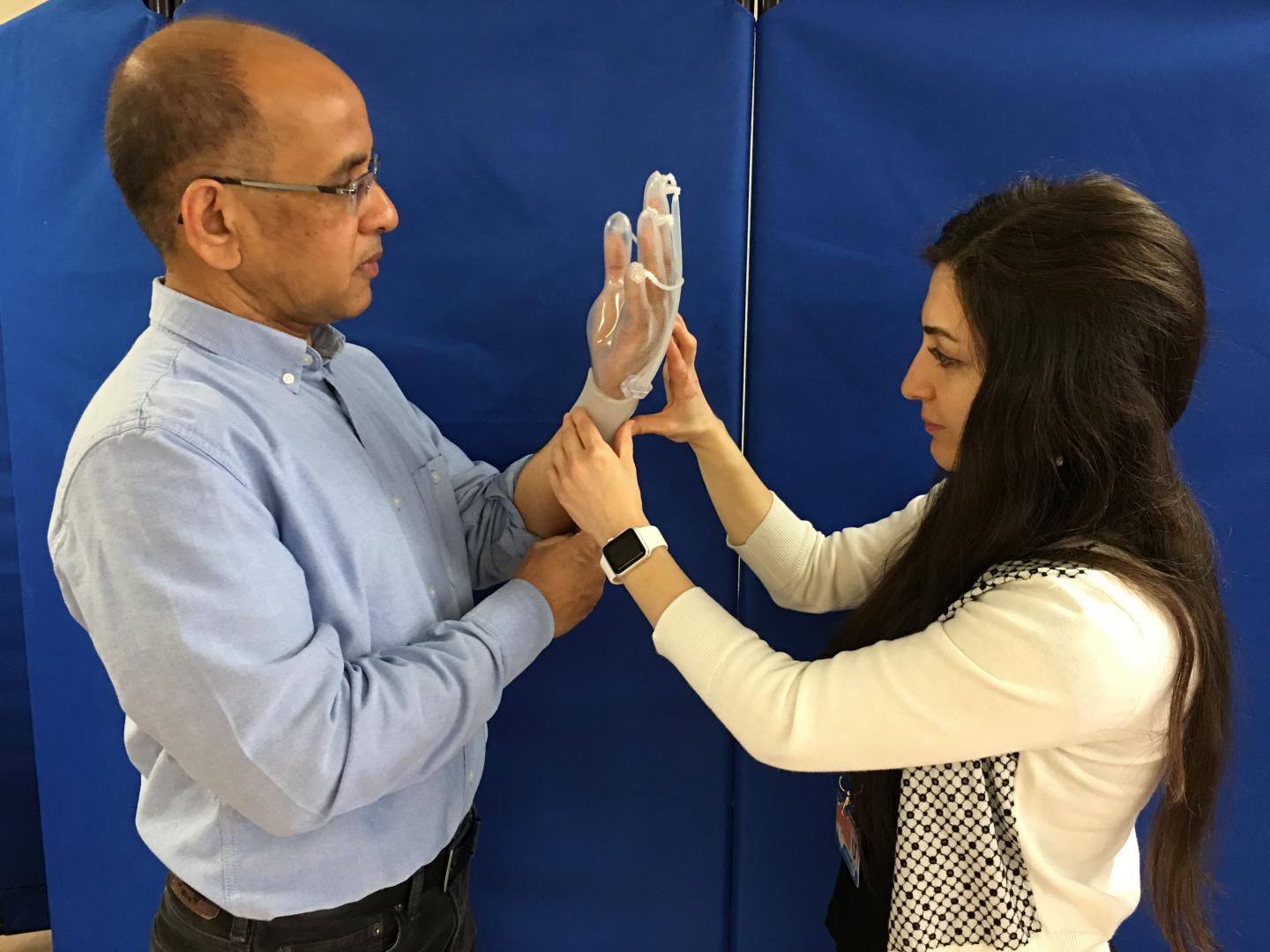
Credit: University of Texas at Arlington Research Institute
The revolutionary bioengineered healing glove created by researchers at the University of Texas at Arlington Research Institute (UTARI) and the University of Washington has completed another key step on the road toward commercialization.
Empowered by a $227,000 award from the Medical Technology Enterprise Consortium (MTEC), the REHEAL Glove team at UTARI and REHEAL LLC has successfully developed a manufacturing process for the technology. The MTEC agreement, awarded in October 2017, funded the development of this low volume manufacturing process, which has created 100 flexible polymeric gloves for early stage clinical trials.
The success of the project earned UTA the MTEC Prototype of the Year Acceleration Award (under $1 million) at the consortium’s fourth annual membership meeting in March. The award is given to the project that effectively advances a novel prototype technology to its next major milestone in a 12-month period.
The REHEAL Glove is a flexible glove wound dressing for treatment after hand trauma that provides commonly used negative pressure wound therapy. It also allows early motion therapy during healing to reduce scarring that prevents irreversible joint stiffness.
Additionally, the glove provides a means for delivering therapeutics and controlling the wound environment for better and faster healing. The REHEAL Glove can be easily applied and removed, and does not adhere to the wound, which minimizes pain during dressing removal. The material of the glove is made of transparent silicone, enabling for continuous monitoring of the wound.
Muthu Wijesundara, head of the Biomedical Technologies Division at UTARI and leader of the project, said the development of the manufacturing process established consistency throughout production and poises the glove for transition into clinical trials.
“The manufacturing process gives us more reliability and uniformity in the REHEAL Glove production,” Wijesundara said. “Having this process reduces the risk of variants among the gloves interfering with any future clinical trial work.”
Mickey McCabe, executive director of UTARI, said the award builds UTA’s reputation among the federal research community as an effective, efficient institute for advancing research ideas to practical implementation while improving health and the human condition.
“The MTEC award is a recognition that UTA and UTARI have the expertise and resources necessary to take on time-sensitive, goal-oriented projects,” McCabe said. “This award also builds on a long history of successful delivery of research results and intellectual property to companies and all branches of our nation’s military.”
MTEC is a biomedical technology consortium collaborating with multiple government agencies under a 10-year renewable Other Transaction Agreement with the U.S. Army Medical Research and Materiel Command. The consortium focuses on the development of medical solutions that protect and heal those that serve.
“Complex hand wounds can be debilitating, and current therapies often lead to excessive scar formation and fail to preserve range of motion,” said Lauren Palestrini, MTEC director of research programs. “I believe that the REHEAL Glove addresses many of these limitations and hope its utilization will improve treatment of these injuries. The team, led by Dr. Wijesundara, has done a great job developing a process for low volume production.
“The completion of this work is critical in helping the team move forward with testing this hand wound care-dressing system in early feasibility studies and subsequent clinical trials. We are proud to support the work of the team at UTARI as they advance this game-changing technology.”
The project was borne from a collaboration between Wijesundara and Christopher Allan, associate professor of orthopedics and sports medicine at the University of Washington. Allan acts as the clinical partner, while Wijesundara and UTARI provide the engineering support.
“The forward momentum of the REHEAL Glove project is an outstanding demonstration of UTARI’s mission to link laboratory discoveries to commercialization that ultimately benefits society,” UTA Vice President for Research Duane Dimos said. “I am proud to know this level of cutting-edge research and development is taking place at our University. Thank you to Dr. Wijesundara and his team for their commitment to a project that will serve to improve the treatment and prognosis of serious hand injuries.”
###
Media Contact
Dana Jennings
[email protected]
Original Source
https:/




